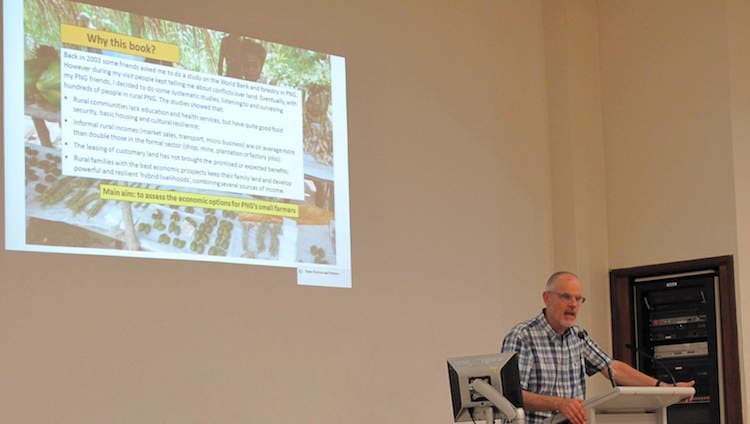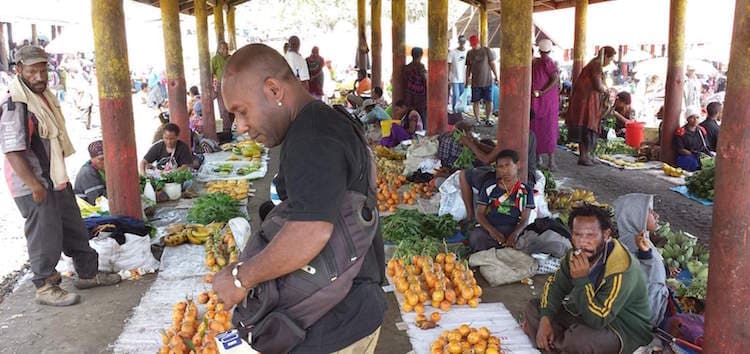PNG Ways: hybrid livelihoods and human development

Summary of paper given at the 2015 Waigani Seminar, by Tim Anderson
Traditional cultures survive because they adapt and change, but those that borrow the worst of others and fail to protect their own strengths can face serious problems. PNG's constitution at independence made commitments to ‘Papua New Guinean Ways’ and Human Development, a decade before the UNDP’s Human Development project. Customary land management was recognised and protected in law, while those who framed the Constitution cautioned of ‘the darkness of neon lights'. What remains of that vision, today?
Almost uniquely, Papua New Guinea did not have its traditional land tenure system dismantled by the colonial powers. That still provides a basis for very broad access to basic food and shelter, as well as cultural identity and social security. On the other hand, communities have little access to health services and education, and most have poor roads. Most children have not been able to complete school and cannot see a doctor. With billions of dollars in gas and mineral revenues in recent years, the PNG Government does not lack resources. Yet it has not yet committed seriously to investment in its own people. Building on rich, hybrid rural livelihoods, while using revenue from mineral wealth to extend the key neglected sectors of health and education, would represent a unique ‘Papua New Guinean Way’ of development.
PNG has had great economic 'success' in recent years, but human development has been very poor, especially given the enormous resources of the country. UNDP figures show that, despite PNG's strong performance in exports and GDP, education and health fell way behind. PNG's ranking in the Human Development Index, between 1995 and 2014, fell from 126th to 157th.
In 2012 the PNG Government began a welcome move to abolish school fees, up to year 10; but commercialisation of the program has undermined the promise. There is a crisis in health services, as Health Minister Michael Malabag has acknowledged, linked to a shortage of health workers. There have been Cuban offers of assistance in doctor training since 2006, but no government since then has followed up, because of covert resistance by private doctors. Strategy seems short sighted. There is little recognition of the human development challenge in the government document ‘Papua New Guinean Vision 2050’. Instead there is reliance on the natural gas boom and a 'land reform' drive, which would take land out of community hands and entrust it to foreign companies for monoculture industries. That in turn would undermine PNG's rural livelihoods.
In reality, subsistence production and local cash economies combine to form the backbone of PNG's rural economy through complex 'hybrid livelihoods'. In the more successful versions we see families growing food in their own gardens, selling crops in local markets, growing some export crops for sale, running small businesses (chicken raising, transport and small stores) and taking on some formal employment. The richness of these hybrid livelihood is underwritten by family-owned customary land.

Studies brought together in my book Land and Livelihoods in Papua New Guinea (2015) show that no formal sector activity even comes close to matching the real economic value produced by PNG's rural land-owning families, just in food and housing. That is not counting the additional value of customary land systems: a social distribution system, social security, employment creation, cultural reproduction and environmental stabilisation.
For example, women roadside sellers in four provinces were found to earn, on average, well over twice the income of rural workers in factories, mines and stores. Why would they want to rent their family land? Neither rural rents nor engagement with formal economies provide either the range of options or the income potential of the various components of rural hybrid livelihoods, based on customary land. Of course some families do better than others, and that is why better public information on these 'hybrid livelihoods' is needed.
PNG needs a new strategic focus on rural livelihoods, public health and education, restoring the priorities given to human development and ‘Papua New Guinean Ways’ at independence. The huge informal sector, including subsistence production and domestic exchange, is a source of great strength that has not been properly counted. PNG has fallen into the trap of borrowing the worst of some other countries, while ignoring its own strengths. Why constantly emphasise 'private sector development' when has there been so little sustained investment in public education and heath? Why does 'Vision 2050' even bother speaking of achieving a 'high human development ranking' with adult literacy rates lower than much of sub-Saharan Africa? A redirection is necessary.
Download the full paper below
